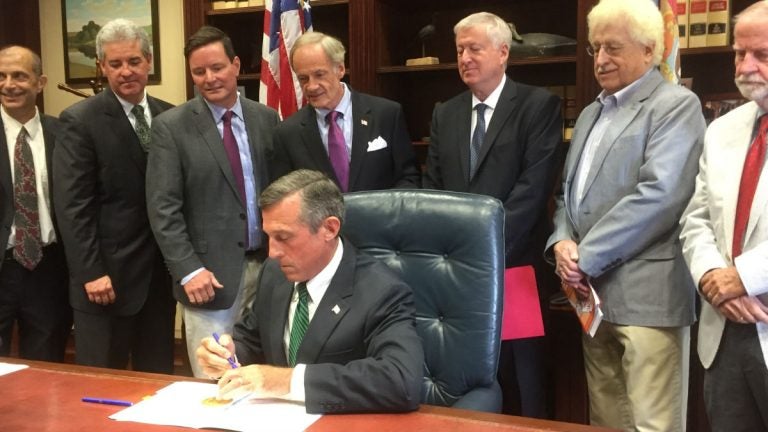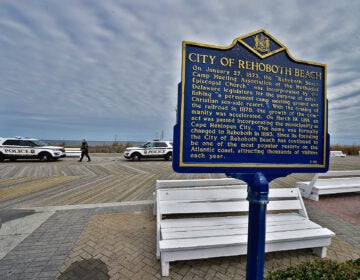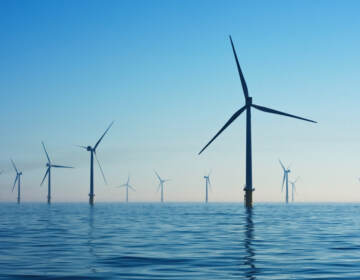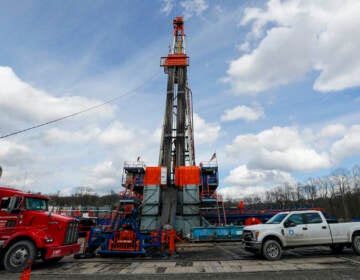Delaware takes another try at offshore wind [video]
Listen
Gov. Carney signed an executive order to create a working group to examine the possibility of offshore wind in Delaware.(Zoë Read/WHYY)
Gov. Carney signed an executive order to explore the possibility of offshore wind in Delaware.
Gov. John Carney, D-Delaware, signed an executive order Monday to establish a working group to study the feasibility of developing offshore wind technology in Delaware.
The Offshore Wind Working Group will evaluate the environmental and economic development benefits of offshore wind, and consider the costs and logistics of construction.
The executive order is part of the state’s overall goal to reduce air and greenhouse gas emissions, as well as create more jobs.
This is not the first time the state has attempted to develop offshore wind technology. Several years ago, NRG Energy stopped plans for development in the state due to what it called “monumental challenges.”
Carney said he believes the technology is more favorable today.
“We’ve been down this road before, and were unsuccessful in getting a project off the coast of Sussex County off the ground, but I think conditions have changed significantly, but this working group is going to be established to investigate those conditions, look at new technologies, look at the effect on electricity rates in the state to see if there’s an opportunity for Delaware to finally go down that path and get some offshore wind generation going,” said Carney, who used to work for energy company Transformative Technologies.
The working group will submit a report to Carney by December 15th detailing recommendations for offshore wind development, as well as drafting legislation if necessary to implement new offshore wind plans.
The executive order is in line with an effort between northeast states to continue to reduce emissions through 2030 as part of the Regional Greenhouse Gas Initiative, and with changes to the program to reduce carbon dioxide emissions in the region from the electricity sector by an additional 30 percent between 2021 and 2030.
Delaware also joined the U.S. Climate Alliance in June to comply with the Paris Climate Agreement—something President Donald Trump vowed to withdraw the U.S. from.
Carney and other Delaware leaders also have been vocal about their opposition to the Trump Administration’s plans to move forward to allow oil and gas drilling in the Atlantic.
Department of Natural Resources and Environmental Control Secretary Shawn Garvin said now more than ever it’s critical the state, nation and world take advantage of renewable sources and move away from fossil fuels.
“Delaware is the lowest lying state in the nation. We are already feeling the impacts of climate change—from Wilmington, to Cape Henlopen, to Seaford, to Marydel—we recognize if we don’t do something to address fossil fuel consumption, 11 percent of this state will be inundated by water by end of this century,” he said.
“So, it’s critically important to take steps, and as there’s been some falling back on leadership at the federal level, Governor Carney has joined governors and mayors throughout the country to say, ‘We’re still going to do our part here in Delaware.’ So, this working group and our ability to look at both economic benefits of investment in wind, but also the environmental benefits in wind, is critically important.”
U.S. Sen. Tom Carper, D-Delaware, also joined Carney during the signing of the executive order. Carper and U.S. Sen. Susan Collins, R-Maine, recently introduced legislation that would provide an investment tax credit to encourage investment in offshore wind energy.
“There are a lot of jobs that flow from offshore wind, they include the construction of the turbines, the blades, they include deployment, they include maintenance of these huge machines, putting in the transmission lines, and making sure the machines are maintained over the years,” he said.
“There are 3 million jobs in this country today associated with renewable energy and energy conservation, 70,000 created last year alone—there are 75,000 coal mining jobs in the whole country. These are good jobs and that’s why offshore wind has taken off.”
WHYY is your source for fact-based, in-depth journalism and information. As a nonprofit organization, we rely on financial support from readers like you. Please give today.





